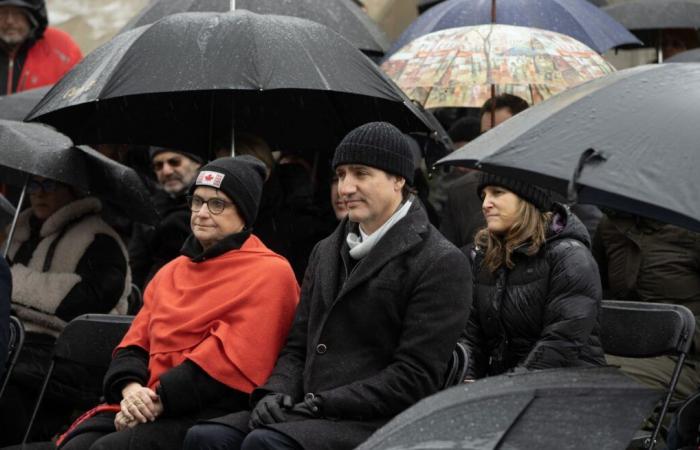A new guide on anti-Semitism released by the Canadian government is sparking controversy among Palestinian rights activists, who fear its principles could restrict the freedom to criticize the state of Israel.
The fifty-page manual is based on the International Holocaust Remembrance Alliance’s (IHRA) working definition of anti-Semitism — a definition that many say confuses anti-Semitism with criticism of ‘Israel.
This definition, which brings together several examples of forms of anti-Semitism, notably includes the controversial principle of “unequal treatment of the State of Israel”.
According to this principle, criticisms leveled against Israel “which differ from those leveled against any other country […] could be anti-Semitic because they are discriminatory.” To avoid falling into anti-Semitism, we must instead “criticize Israel as we would criticize any other state”.
“It sets a line where some criticism of Israel is acceptable, but then introduces a gray area, where that criticism could be perceived as unfair or discriminatory,” laments Michael Bueckert, vice-president of Canadians for Justice and Peace. Middle East (CJPME) in interview with Duty.
The guide specifies that unequal treatment of Israel often results in “disproportionate, sometimes obsessive, criticism of Israel compared to other countries.”
“Israel is the only country that has maintained an illegal occupation for 56 years and the only country currently engaging in genocidal actions in the Middle East. How can we criticize it in the same way we criticize other countries? » he asks.
Opposing the ideology of Zionism, the belief that the Jewish people have the right to self-determination in the land of Israel, is also an anti-Semitic act, according to the guide.
The Canadian special envoy for preserving the memory of the Holocaust and the fight against anti-Semitism, Deborah Lyons, rejects the fact that the new guide is an attack on freedom of expression.
In interview with Dutyshe indicates that the document is simply an “educational” resource for Canadians. “I think this extreme feeling that this is going to limit freedom of expression is a reaction that is really not based on a complete understanding of the definition,” she said.
A “pro-censorship” guide
According to the government, the new guide will aim to provide “practical recommendations” to stakeholders in various fields, such as schools, workplaces and the judicial system. However, it has no legally binding effect, it is specified in the preface to the document.
“This Canadian guide to the AIMH’s operational definition of anti-Semitism does not replace, modify, or direct the interpretation of any existing federal, provincial or municipal law or regulation,” it reads.
However, the CJPME still fears that this “pro-censorship” guide will have a “paralyzing” effect on pro-Palestinian speech and activism.
“I think we will see many cases where people are investigated, suspended or fired, and organizations are defunded because of complaints about their speech about Israel based on this manual,” he said. its vice-president, Michael Bueckert.
He believes that organizations do not have the necessary tools to effectively assess a complaint based on the IHRA guide. “That creates a lot of potential for it to be used against free speech.” »
On Sunday, more than 14,250 people signed an electronic letter (CJPME initiative) addressed to the federal government to demand the withdrawal of the published guide.
Canadian special envoy Deborah Lyons deplores a “smear campaign” (smear campaign).
“This definition just helps educate people more. This does not entail any legal structure. I think there has been some sort of smear campaign to imply that this is something worse [que ce ne l’est] », Says the former Canadian ambassador to Israel (2016-2020).
She adds that she has full confidence in institutions to determine the limits between legitimate criticism and hateful speech. “This must always be looked at in the context of the facts. It is essential that the evaluation is fact-based, taking into account context, as well as intention and impact,” she adds.
The divided Jewish community
In addition to demanding the withdrawal of the document, the CJPME is also calling for the departure of Deborah Lyons as Canada’s special envoy for the preservation of the memory of the Holocaust and the fight against anti-Semitism.
The latter was appointed by Prime Minister Justin Trudeau in the fall of 2023 for a two-year mandate.
In June, the CJPME published a report in which it accused Mme Lyons to spread “false and malicious claims about pro-Palestinian activists.” The organization also denounces the fact that she has no training related to anti-racism.
Called to react, Deborah Lyons replied that “anyone in this role would be subject to criticism”, and that her duty is to defend the interests of the Jewish community.
“We know that 70% of reported religiously motivated hate crimes target the Jewish community. I therefore represent a community which, in my opinion, deserves special attention in the face of this extremely difficult environment that it has had to endure in recent years,” she says.
The publication of the new guide written under the supervision of Mme Lyons, however, divides the Jewish community itself.
Independent Jewish Voices, United Jewish People’s Order and the Jewish Faculty Network Steering Committee opposed the publication of the document and are calling for its removal.
According to them, the IHRA definition “associates criticism of Israel with racism against Jews as a whole, and promotes anti-Palestinian racism.”
“Sincere efforts to combat anti-Semitism must not undermine the right to uphold the protection and dignity of all oppressed peoples, including Palestinians,” the three organizations said in a joint statement.
The Advisory Center for Jewish and Israeli Relations, however, applauded the publication of the guide.
Canada joined the IHRA in 2009 and adopted its operational definition of anti-Semitism in 2019. Canada’s new guide on anti-Semitism responds to a commitment made by Prime Minister Justin Trudeau in 2022.






